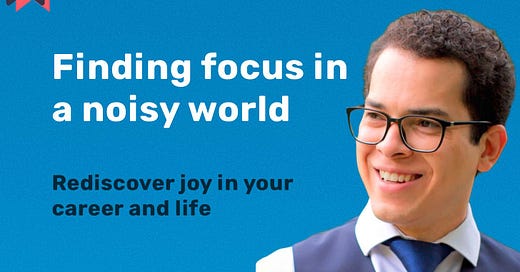Dear Reader,
If I had to share just one piece of advice for being more productive and happier, it would be this: learn to prioritise your focus and cut through the noise.
Noise is anything that pulls you away from your true goals—external expectations, fleeting trends, or pressures that scatter your energy. In a world overflowing with information and obligations, knowing what to focus on is more valuable than trying to do everything.
Let me illustrate this with something that recently rekindled my sense of wonder: time.
My fascination with time was reignited during a visit to the Natural History Museum in London, where I stood mesmerised—just like a child—before the world of dinosaurs. It reminded me that true passion lies in pursuing what genuinely excites you, even if it’s not what others expect. This applies to my work in AI, where I strive to focus on the aspects that truly ignite my curiosity, rather than every passing trend. Many of us get trapped trying to meet external expectations instead of following what truly excites us. But constantly chasing approval leads to frustration, not fulfillment.
A perspective on time
To put our daily concerns into perspective, consider the vastness of cosmic time:
The universe has existed for 13.8 billion years. The Earth for 4.5 billion years. Life appeared around 3.5–4 billion years ago. Modern humans have been around for only about 300,000 years. And civilization? Just 6,000 years.
That’s a blink of an eye in cosmic time. So why waste our short existence trying to keep up with every trend, every expectation, and every distraction?
Sharpen your focus
We live in an era of hyper-connectivity. There’s pressure to engage in everything—from politics to the latest AI breakthroughs—out of fear of falling behind. Globalization makes it seem like we must have a voice in every discussion.
But do we really have to?
The truth is, we can’t do everything. Society, family, and peers may expect us to, but that doesn’t mean we must comply. If we spread ourselves too thin, we risk contributing little and enjoying even less.
Instead, we need to concentrate on what truly matters:
Focus on what excites you and go deep into it.
Let go of the fear of missing out.
Don’t let others dictate where your energy should go.
Here are a few practical approaches I’ve found helpful:
Identify your priorities: Start by defining your top 1-3 goals. What truly matters to you? Write them down and keep them visible.
Set boundaries: Schedule specific times for focused work and disconnect from distractions, like unnecessary emails or social media.
Practice mindful consumption: Be intentional about the information you consume. Ask yourself: Is this relevant to my goals? If not, let it go.
Progress over perfection: Realise that not everything needs to be perfect. Focus on progress, not perfection, by setting realistic deadlines.
Schedule curiosity time: It is important to nurture curiosity. I do this by scheduling specific times to read, watch documentaries, or explore topics I’m interested in without feeling guilty about it taking me away from other tasks. This allows for exploration, without it becoming a distraction.
Without focus, we risk leading lives dictated by external forces rather than our own passions. Prioritising your focus isn’t about ignoring the world—it’s about choosing where to invest your time and energy for the greatest personal fulfillment and impact.
Key Points
External distractions and societal expectations can easily pull you away from what truly matters, making it essential to prioritise.
While a childlike curiosity fosters lifelong learning, time is limited, so choosing wisely is crucial.
Just because the world constantly demands your attention doesn’t mean you owe it. You have the power to decide where to focus your energy. If you don’t make that choice, someone else will do it for you.
By deeply engaging in your passions, you not only find personal fulfillment but also make a more meaningful contribution to the world.
So, what’s your focus for this month then?
See you next week.



